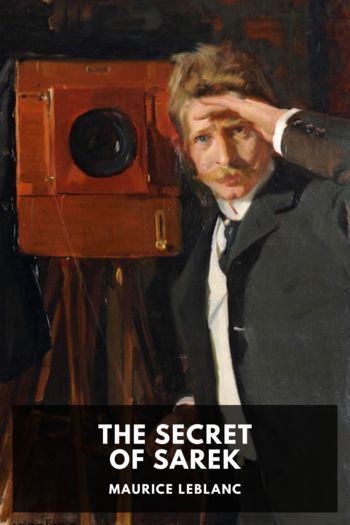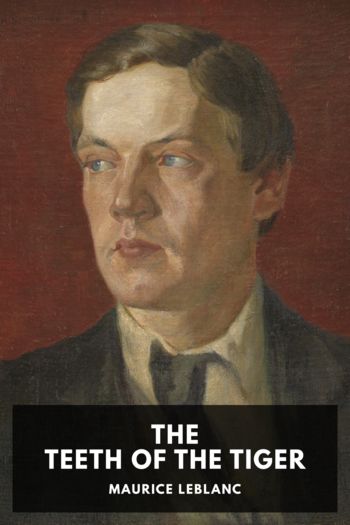The Secret of Sarek - Maurice Leblanc (easy to read books for adults list TXT) 📗

- Author: Maurice Leblanc
Book online «The Secret of Sarek - Maurice Leblanc (easy to read books for adults list TXT) 📗». Author Maurice Leblanc
Véronique did not speak. She felt very faint and sat down on the stone, with her head bowed.
Then she murmured:
“You speak of my father as though he were still alive today.”
“He is.”
“And as though you saw him often.”
“Daily.”
“And on the other hand”—Véronique lowered her voice—“on the other hand you do not say a word of my son. And that suggests a horrible thought: perhaps he did not live? Perhaps he is dead since? Is that why you do not mention him?”
She raised her head with an effort. Honorine was smiling.
“Oh, please, please,” Véronique entreated, “tell me the truth! It is terrible to hope more than one has a right to. Do tell me.”
Honorine put her arm round Véronique’s neck:
“Why, my poor, dear lady, would I have told you all this if my handsome François had been dead?”
“He is alive, he is alive?” cried Véronique, wildly.
“Why, of course he is and in the best of health! Oh, he’s a fine, sturdy little chap, never fear, and so steady on his legs! And I have every right to be proud of him, because it’s I who brought him up, your little François.”
She felt Véronique, who was leaning on her shoulder, give way to emotions which were too much for her and which certainly contained as much suffering as joy; and she said:
“Cry, my dear lady, cry; it will do you good. It’s a better sort of crying than it was, eh? Cry, until you’ve forgotten all your old troubles. I’m going back to the village. Have you a bag of any kind at the inn? They know me there. I’ll bring it back with me and we’ll be off.”
When the Breton woman returned, half an hour later, she saw Véronique standing and beckoning to her to hurry and heard her calling:
“Quick, quick! Heavens, what a time you’ve been! We have not a minute to lose.”
Honorine, however, did not hasten her pace and did not reply. Her rugged face was without a smile.
“Well, are we going to start?” asked Véronique, running up to her. “There’s nothing to delay us, is there, no obstacle? What’s the matter? You seem quite changed.”
“No, no.”
“Then let’s be quick.”
Honorine, with her assistance, put the bag and the provisions on board. Then, suddenly standing in front of Véronique, she said:
“You’re quite sure, are you, that the woman on the cross, as she was shown in the drawing, was yourself?”
“Absolutely. Besides, there were my initials above the head.”
“That’s a strange thing,” muttered Honorine, “and it’s enough to frighten anybody.”
“Why should it be? It must have been someone who used to know me and who amused himself by … It’s merely a coincidence, a chance fancy reviving the past.”
“Oh, it’s not the past that’s worrying me! It’s the future.”
“The future?”
“Remember the prophecy.”
“I don’t understand.”
“Yes, yes, the prophecy made about you to Vorski.”
“Ah, you know?”
“I know. And it is so horrible to think of that drawing and of other much more dreadful things which you don’t know of.”
Véronique burst out laughing:
“What! Is that why you hesitate to take me with you, for, after all, that’s what we’re concerned with?”
“Don’t laugh. People don’t laugh when they see the flames of hell before them.”
Honorine crossed herself, closing her eyes as she spoke. Then she continued:
“Of course … you scoff at me … you think I’m a superstitious Breton woman, who believes in ghosts and jack-o’-lanterns. I don’t say you’re altogether wrong. But there, there! There are some truths that blind one. You can talk it over with Maguennoc, if you get on the right side of him.”
“Maguennoc?”
“One of the four sailors. He’s an old friend of your boy’s. He too helped to bring him up. Maguennoc knows more about it than the most learned men, more than your father. And yet …”
“What?”
“And yet Maguennoc tried to tempt fate and to get past what men are allowed to know.”
“What did he do?”
“He tried to touch with his hand—you understand, with his own hand: he confessed it to me himself—the very heart of the mystery.”
“Well?” said Véronique, impressed in spite of herself.
“Well, his hand was burnt by the flames. He showed me a hideous sore: I saw it with my eyes, something like the sore of a cancer; and he suffered to that degree …”
“Yes?”
“That it forced him to take a hatchet in his left hand and cut off his right hand himself.”
Véronique was dumbfounded. She remembered the corpse at Le Faouet and she stammered:
“His right hand? You say that Maguennoc cut off his right hand?”
“With a hatchet, ten days ago, two days before I left. … I dressed the wound myself. … Why do you ask?”
“Because,” said Véronique, in a husky voice, “because the dead man, the old man whom I found in the deserted cabin and who afterwards disappeared, had lately lost his right hand.”
Honorine gave a start. She still wore the sort of scared expression and betrayed the emotional disturbance which contrasted with her usually calm attitude. And she rapped out:
“Are you sure? Yes, yes, you’re right, it was he, Maguennoc. … He had long white hair, hadn’t he? And a spreading beard? … Oh, how abominable!”
She restrained herself and looked around her, frightened at having spoken so loud. She once more made the sign of the cross and said, slowly, almost under her breath:
“He was the first of those who have got to die … he told me so himself … and old Maguennoc had eyes that read the book of the future as easily as the book of the past. He could see clearly where another saw nothing at all. ‘The first victim will be myself, Ma’me Honorine. And, when the servant has gone, in a few days it will be the master’s turn.’ ”
“And the master was … ?” asked Véronique, in a whisper.
Honorine drew herself up and clenched her fists





Comments (0)